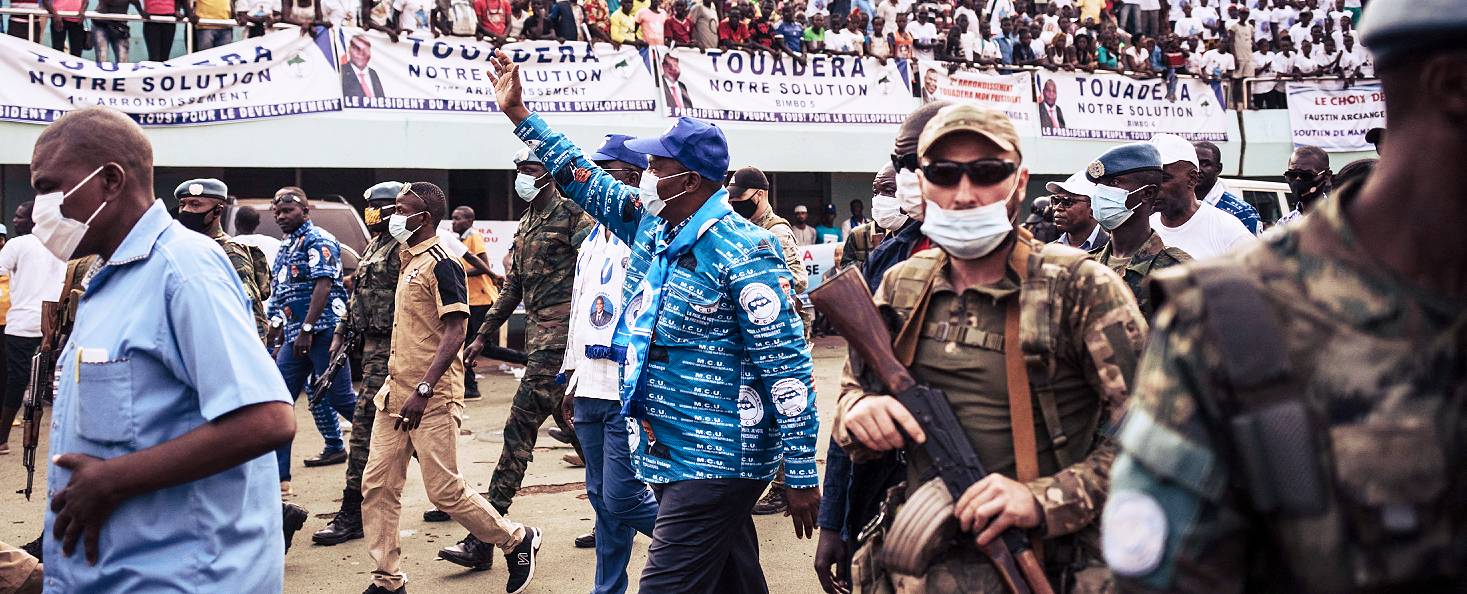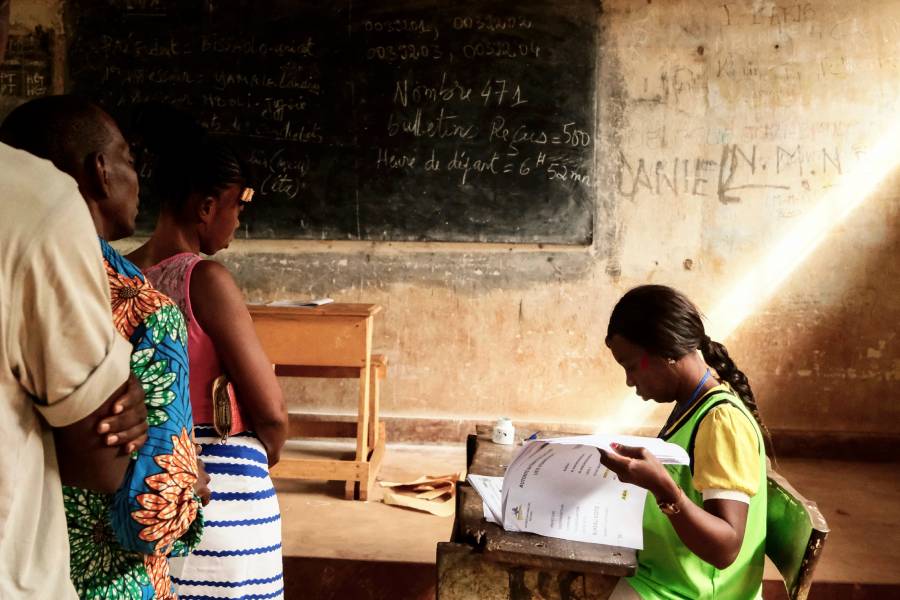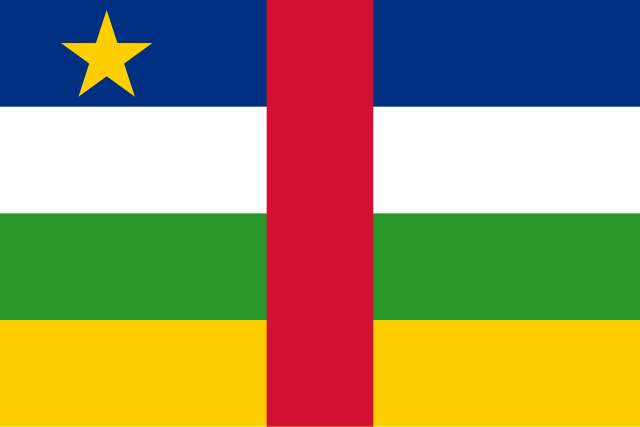« Previous: Guinea-Bissau (November 30)
Presidential and Legislative Elections
December
A blueprint for what can be expected in the Central African Republic’s (CAR) 2025 presidential election can be seen in CAR’s 2023 constitutional referendum. Midway into his second and final constitutionally limited presidential term, President Faustin-Archange Touadéra initiated a constitutional revision to remove the term limit restriction and sidestep this guardrail against the concentration of authority. The effort to evade term limits nearly always occurs within a backdrop of other measures to weaken the rule of law. In the case of Touadéra, this included making the Constitutional Court a government-controlled council, allowing the president to appoint additional justices to the Supreme Court, and voiding the National Assembly’s role in overseeing mining contracts. Presidential terms would also be extended from 5 to 7 years.
The effort to evade term limits nearly always occurs within a backdrop of other measures to weaken the rule of law.
When the head of the Constitutional Court, Danièle Darlan, ruled that the proposed constitutional referendum was illegal, Touadéra replaced her. The campaigning around the subsequent referendum was one-sided, as critics of the power grab—including politicians, media, and civil actors—were barred from holding rallies, intimidated, and detained. Touadéra and his Russian sponsors, meanwhile, dominated the media and social media space in favor of the referendum. This generated the desired outcome, providing Touadéra with a fig leaf, behind which he would run again in 2025.
The referendum, in turn, followed a pattern of strong-arm tactics employed in the 2020 presidential election cycle.
The political space in CAR has only further deteriorated since—with little pretense for fairness. Opposition leaders, such as Member of Parliament Dominique Yandocka, have been imprisoned despite their parliamentary immunity. Civil rights activists, like Crépin Mboli Goumba, have been arrested on charges of defamation and contempt of court. (Mboli Goumba was subsequently detained at the notorious Central Office for the Repression of Banditry for providing documentation of corruption, implicating four judges and the minister of justice). Opposition parties are banned from holding rallies and discredited via organized disinformation campaigns that accuse them of supporting rebel armed groups. Critics are also subject to surveillance, online intimidation, and physical violence by youth militia associated with the ruling Mouvement des cœurs unis (MCU) party. One such group, Les requins (Sharks), conducts armed patrols and beats up suspected opposition supporters. Its founder, Héritier Doneng, was appointed Minister for the Promotion of Youth and Sport in 2024.

Faustin Archange Touadéra (center) greets his supporters at an electoral rally, escorted by the presidential guard and Russian mercenaries. (Photo: AFP/Alexis Huguet)
Intimidation of opposition parties has also been accompanied by a shrinking of the media space. Journalists and media outlets who raise concerns over ongoing insecurity or undue influence of Russia (whose mercenary forces serve as a presidential guard for Touadéra while a Russian serves as national security advisor) are subject to threats, arrests, or closures. As a result, most media outlets now refrain from publishing anything critical of the government or its partnership with Russia. Mimicking Russian information manipulation operations elsewhere in Africa, the Russian-sponsored Galaxie panafricaine engages in aggressive social media campaigns to intimidate government critics in CAR from expressing their opinions. This includes the dissemination of private information of the critics online. Russian forces are also alleged to monitor the movements of critics with drones.

Voters wait as a electoral commission official checks a voter’s roll at the polling station in Bangui. (Photo: AFP/Camille Laffont)
Russia has leveraged its effective capture of the Touadéra government to gain control of CAR’s natural resources, including gold, diamond, and logging concessions. This has led to the effective annexation of territory around these concessions, involving attacks on artisanal miners and evicting local communities from their villages. Incidents include the attack on the Ndassima gold mine in 2021, where Wagner forces killed miners to gain control of the site. Similar attacks occurred in Aïgbado and Yanga in early 2022, with at least 70 people killed. Survivors face continued danger, with reports of disappearances and killings at new mining sites. With Russian plans to establish a permanent military base in the country, CAR offers lessons for other African countries of the risk of lost sovereignty associated with expanded Russian political interference.
CAR’s democratic backsliding—and the reduced avenues for democratic self-correction this entails—has direct implications for citizen well-being. CAR is ranked 149 out of 180 countries on Transparency International’s Corruption Perceptions Index, and an estimated 97.5 percent of its gold production is smuggled out of the country. This level of corruption dramatically limits revenues that could be invested in development initiatives while fueling the criminal trafficking networks that perpetuate CAR’s instability.
The security situation in CAR continues to be volatile, particularly in the northwest and eastern parts of the country, as armed groups compete for control over natural resources and taxes on primary roads. The growing threat posed by these groups has resulted in an 83-percent increase in the number of civilian victims over the past year. Russian and Emirati support for the rebel Rapid Support Forces in neighboring Sudan via CAR adds a regional layer of instability to the decline in accountable governance in CAR.
Despite the risks and the many obstacles to a free and fair electoral process, opposition parties continue to offer alternative paths forward.
Despite the risks and the many obstacles to a free and fair electoral process, opposition parties continue to offer alternative paths forward for CAR. This includes those from the ruling party who have been sidelined and are positioning themselves as an alternative, such as Henri-Marie Dondra, a former prime minister and minister of finance. These reformist efforts merit greater regional and international attention if the growing cycle of impunity is to be broken. Absent that, CAR’s political trajectory will have wider implications for instability, illicit trafficking, and the influence of external actors in the region.
Hany Wahila is a Research Assistant with the Africa Center for Strategic Studies.
Previous
« Guinea-Bissau (November 30)


 Central African Republic: Elite Capture becoming State Capture
Central African Republic: Elite Capture becoming State Capture